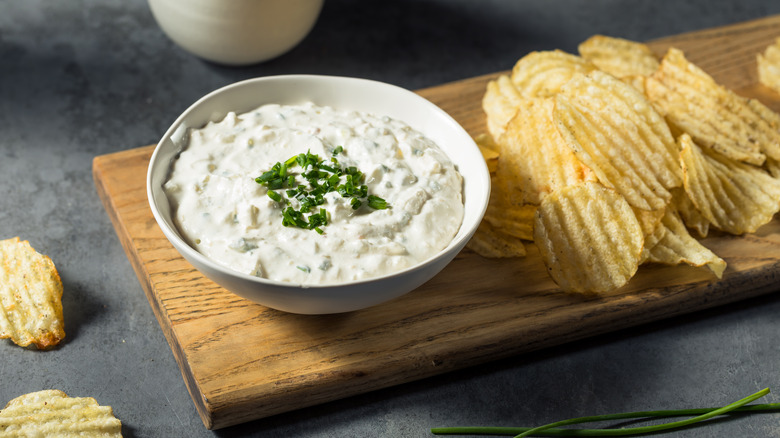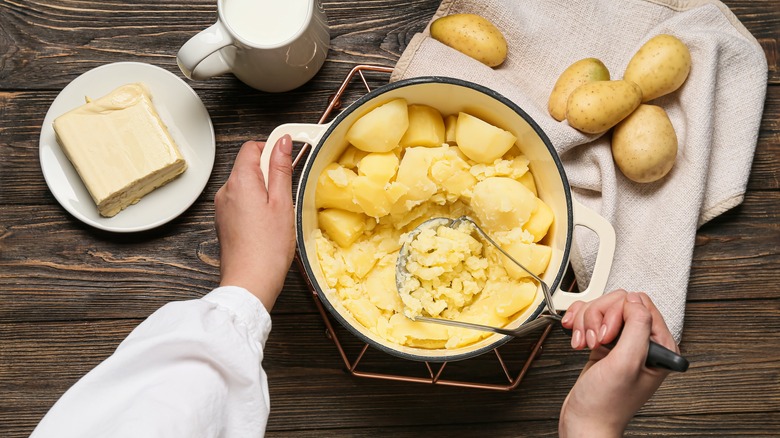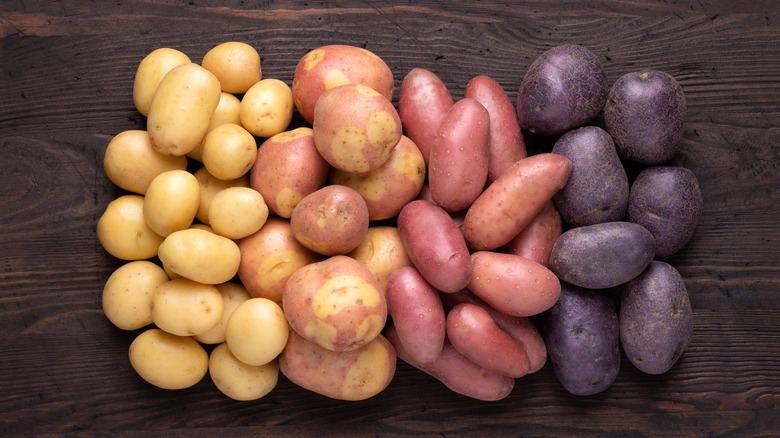French Onion Dip Is The MVP For Creamy, Savory Mashed Potatoes
The best mashed potatoes are transcendent. The worst of them are still pretty good, and can often be redeemed with an extra ladle of gravy. The dish is a mainstay, and the textbook combination of potatoes, butter, milk, and salt remains unparalleled. However, that has not stopped chefs throughout history — professional and amateur alike — from trying to create their own iconic styles of mashed potatoes. While some attempts might seem like more trouble than they're worth, tweaking this timeless recipe can delightfully surprise diners who come to the table with certain taste expectations.
One unexpected twist that consistently hits the mark is the inclusion of French onion dip. This doesn't necessarily mean a homemade concoction; even store-bought, jarred French onion dip — the sort you'd typically pair with potato chips or pretzels — can do the trick. This dip can substitute for milk, a frequent mashed potato ingredient that lends flavor and texture. What sets it apart is the added bonus of the French onion flavor profile: a savory touch with a hint of tang. Not only does it enhance the flavor, but it also delivers the creamy consistency expected from its dairy counterparts.
Why French onion dip keeps mashed potatoes creamy
The inclusion of dairy — be it milk, butter, French onion dip, or a mix of these — establishes an emulsion in the mashed potatoes, resulting in their creamy texture. When potatoes are mashed, they release starch. When paired with water, this starch forms a gluey consistency. Anyone who's spent time with a potato masher can attest that if potatoes were only mashed and then served, the result would be less than palatable. While the release of this starch is inevitable, its effects can be mitigated with additional ingredients — such as French onion dip.
Dairy products contain casein proteins, which limit the release of starch during mashing, much like plugging a leak in a wooden ship's hull. Furthermore, the inherent fats in dairy surround the potato starch strands — forming the emulsion — and prevent them from expanding and turning into a sticky mess. Many store-bought French onion dips contain milk products, providing the necessary components to engage with mashed potatoes at a molecular level, and helping them remain creamy instead of gluey.
Choose the right type of potato to mash
While French onion dip contributes to both flavor and texture, the best mashed potatoes are made by choosing the right kind of spuds to go with the dip. Although most shoppers recognize potatoes by their store labels, these tubers can be further classified based on their starch content. Understanding the different types of potatoes and the dishes they belong in is crucial.
High-starch potatoes, such as the classic russet and sweet potato, release a notably higher amount of starch when mashed compared to other varieties. This characteristic can make them challenging to use for mashing. Though russets are a popular choice for mashing, they can easily be overworked to a point where no amount of dairy can rescue them. On the opposite end of the spectrum lie low-starch or waxy potatoes like red, purple, and fingerling. Somewhat reminiscent of "Goldilocks and the Three Bears," these potatoes also aren't quite right. They lack the necessary starch content for an ideal mash, making them better suited for roasting.
The "just right" kind of potatoes are called all-purpose, with yukon gold and white being prime examples. Their starch content straddles the line between their counterparts and, when combined with French onion dip, will send Goldilocks, well fed, to a peaceful sleep in the baby bear's bed.



